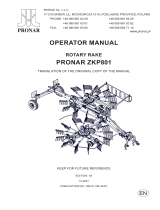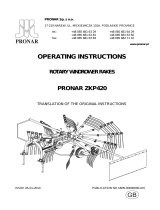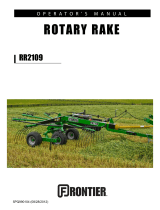Page is loading ...

PRONAR Sp. z o.o.
17-210 NAREW, UL. MICKIEWICZA 101A, PODLASKIE PROVINCE
phone: +48 085 681 63 29 +48 085 681 64 29
+48 085 681 63 81 +48 085 681 63 82
fax: +48 085 681 63 83 +48 085 682 71 10
www.pronar.pl
OPERATOR MANUAL
ROTARY RAKE
PRONAR ZKP460T
TRANSLATION OF THE ORIGINAL COPY OF THE MANUAL
EDITION 1A-06-2016 PUBLICATION NO 524N-00000000-UM


INTRODUCTION
Information in this document is current at date of publication. As a result of improvements, some
numerical values and illustrations in this publication may not correspond to the actual
specification of the machine supplied to the user. The manufacturer reserves the right to
introduce design changes in machines produced that facilitate and improve the quality of
machine operation, without making minor amendments to this Operator Manual.
This Operator Manual is an integral part of the machine documentation. Before using the
machine, the user must carefully read this Operator Manual and observe all recommendations.
This guarantees safe operation and ensures failure-free work of the machine. The machine is
designed to meet obligatory standards, documents and legal regulations currently in force.
The manual describes the basic principles of safe use and operation of ZKP460T Rotary rake.
If the information in this Operator Manual needs clarification, refer for assistance to the sale
point where the machine was purchased or to the Manufacturer.
MANUFACTURER'S ADDRESS:
PRONAR Sp. z o.o.
ul. Mickiewicza 101A
17-210 Narew
CONTACT TELEPHONES
+48 085 681 63 29 +48 085 681 64 29
+48 085 681 63 81 +48 085 681 63 82

SYMBOLS APPEARING IN THIS OPERATOR MANUAL
Information, descriptions of danger and precautions and also recommendations and prohibitions
associated with user safety instructions are marked:
and also preceded by the word "DANGER.” Failure to observe the instructions may endanger
the machine operator's or other person's health or life.
Vital information and instructions that must be observed are by the symbol:
and also preceded by the word "IMPORTANT". Failure to observe the instructions may lead to
damage to the machine as a result of improper operation, adjustment or use.
In order to focus the user's attention on the need to perform maintenance, the relevant section
of the Operator Manual is marked with the pictogram:
Additional tips and advice for machine operation are marked with the sign:
and also preceded by the word "TIP".

DIRECTIONS USED IN THIS OPERATOR MANUAL
Left side – side to the left hand of the operator facing in the direction of machine's forward
travel.
Right side – side to the right hand of the operator facing in the direction of machine's forward
travel.
REQUIRED MAINTENANCE
Maintenance actions described in the manual are marked with the sign:
Result of maintenance/adjustment actions or comments concerning the performance of actions
are marked with the sign:


CONTENTS
1
BASIC INFORMATION 1.1
1.1
ROTARY RAKE IDENTIFICATION 1.2
1.2
INTENDED USE 1.3
1.3
EQUIPMENT 1.5
1.4
TERMS & CONDITIONS OF WARRANTY 1.5
1.5
TRANSPORT 1.6
1.5.1 INDEPENDENT SHIPPING BY THE USER 1.8
1.6
ENVIRONMENTAL RISK 1.9
1.7
WITHDRAWAL FROM USE 1.10
2
SAFETY ADVICE 2.1
2.1
BASIC SAFETY RULES 2.2
2.1.1 USE OF A ROTARY RAKE 2.2
2.1.2 HITCHING AND DISCONNECTING THE ROTARY RAKE 2.3
2.1.3 TRANSPORTING THE MACHINE 2.4
2.1.4 HYDRAULIC SYSTEM 2.5
2.1.5 OPERATION WITH PTO 2.5
2.1.6 MACHINE OPERATION 2.7
2.1.7 CLEANING, MAINTENANCE AND REPAIRS 2.8
2.2
RESIDUAL RISK 2.9
2.3
INFORMATION AND WARNING DECALS 2.10
3
DESIGN AND OPERATION 3.1
3.1
TECHNICAL SPECIFICATION 3.2
3.2
ROTARY RAKE DESIGN 3.3
3.2.1 ROTARY RAKE DESIGN 3.3
3.2.2 HYDRAULIC SYSTEM 3.5

3.2.3 LIGHTING SYSTEM 3.6
3.3
OPERATING PRINCIPLE 3.8
4
CORRECT USE 4.1
4.1
PREPARING FOR WORK BEFORE THE FIRST USE 4.2
4.1.1 CHECKING THE ROTARY RAKE AFTER DELIVERY 4.2
4.1.2 PREPARING THE ROTARY RAKE FOR THE FIRST USE 4.3
4.1.3 TEST START 4.4
4.2
TECHNICAL CONDITION INSPECTION 4.6
4.3
HITCHING TO TRACTOR 4.7
4.4
TRANSPORTING THE MACHINE 4.9
4.4.1 SETTING THE ROTARY RAKE IN TRANSPORT POSITION 4.10
4.4.2 DISASSEMBLING THE RAKING ARMS 4.12
4.5
ROTARY RAKE OPERATION 4.13
4.5.1 SETTING THE ROTARY RAKE TO WORKING POSITION 4.13
4.5.2 SETTING THE RAKING HEIGHT 4.14
4.5.3 SETTING THE SWATH WIDTH 4.16
4.5.4 SETTING THE SIDE TIPPING OF THE WORKING UNIT 4.17
4.5.5 SETTING THE GAUGE WHEEL (OPTION) 4.18
4.5.6 RAKING 4.19
4.6
UNHITCHING THE ROTARY RAKE 4.20
5
MAINTENANCE 5.1
5.1
PRELIMINARY INFORMATION 5.2
5.2
REDUCTION GEAR MAINTENANCE 5.2
5.3
STORAGE 5.4
5.4
LUBRICATION 5.5
5.5
CHECKING AND REPLACEMENT OF SPRING RAKE TINES 5.8
5.6
GAUGE WHEEL MOUNTING 5.9

5.7
TIGHTENING TORQUE FOR NUT AND BOLT CONNECTIONS 5.11
5.8
TROUBLESHOOTING 5.12


SECTION
1
BASIC INFORMATION

Pronar ZKP460T SECTION 1
1.2
1.1 ROTARY RAKE IDENTIFICATION
FIGURE 1.1 Location of the nameplate
(1) nameplate
The ZKP460T rotary rake is marked with a nameplate (1), placed on left side of machine's
lifting arm.
When purchasing the rotary rake, make sure that the serial numbers on the machine are the
same as entered in the WARRANTY BOOK, in sales documents and in the OPERATOR
MANUAL. The meaning of the items on the nameplate is shown in the table below.

SECTION 1 Pronar ZKP460T
1.3
TABLE 1.1 Markings on nameplate
ITEM
MARKING
A Machine name,
B Serial number,
C Type,
D Year of manufacture,
E Gross weight,
F Quality Control marking,
G Machine name, continued.
1.2 INTENDED USE
Rotary rake is designed for agricultural work: raking cut swaths (straw, grass, hays) and
gathering it into windrows on stone free grassland with a level surface. Do NOT use the
machine for any other purpose. Using it as intended also involves all actions connected with
the safe and proper operation and maintenance of the machine. Due to the above, the user is
obliged to:
• carefully read this publication and the PTO shaft Operator Manual and adhere
to the recommendations contained in these documents,
• understand the machine's operating principle and how to operate it safely and
correctly,
• comply with general safety regulations while working,
• prevent accidents,
• comply with road traffic regulations.

Pronar ZKP460T SECTION 1
1.4
TABLE 1.2 Requirements for agricultural tractor
CONTENTS UNIT REQUIREMENTS
Fork type hitch
or drawbar attached to three-point linkage arms -
- ISO 6489-4
-
Hydraulic system
Maximum system pressure
Single acting connection socket
bar / MPa
-
200 / 20
according to ISO 7241-1
Power take-off shaft
Rotation speed
Type / number of PTO splines
rpm
-
540
1 3/8’’ / 6
Other requirements
Minimum power demand
kW / hp
22 / 30
Electrical system
Electrical system voltage
Connection socket
V
-
12
7-pole compliant with ISO
1724
Do NOT perform unauthorised repairs and modifications to the rotary rake as this shall be
treated by the Manufacturer as misusing the machine.
The machine may only be used by appropriately trained users, who are aware of the
dangers, design and operation of the rotary rake. Repairs to the machine shall only be made
by qualified personnel (in the warranty period all repairs must be performed in the warranty
service, indicated by the Manufacturer). Maintenance and repairs that can be performed by
the user, are described in section 5.
IMPORTANT
The rotary rake must not be used for purposes other than those for which it is intended.

SECTION 1 Pronar ZKP460T
1.5
1.3 EQUIPMENT
TABLE 1.3 ZKP460T rotary rake equipment
EQUIPMENT
STANDARD
ADDITIONAL
OPERATOR MANUAL •
WARRANTY BOOK •
PTO shaft (complete) •
Gauge wheels •
Hitching drawbar •
Recommended PTO shafts:
• DS4R131CEKR7001
1.4 TERMS & CONDITIONS OF WARRANTY
PRONAR Sp. z o.o. Narew guarantees the reliable operation of the machine when it is used
according to its intended purpose as described in the OPERATOR MANUAL.
The repair period is specified in the WARRANTY BOOK.
The warranty does not cover those parts and sub-assemblies of the machine which are
subject to wear in normal usage conditions, regardless of the warranty period. Consumables
include the following parts/sub-assemblies:
• tyres,
• spring tine fingers,
• bearings.
The warranty service only applies to such cases as: mechanical damage which is not the
user's fault, factory defects of parts, etc.

Pronar ZKP460T SECTION 1
1.6
In the event of damage arising from:
• mechanical damage which is the user's fault, caused by road accidents,
• by incorrect use, adjustment or maintenance, use of the rotary rake for
purposes other than those for which it is intended,
• use of a damaged rotary rake,
• repairs carried out by unauthorised persons, improperly carried out repairs,
• arbitrary and wilful adjustments to the windrower's structure,
the user will lose the right to warranty service.
The user is obliged to report immediately on noticing any wear in the paint coating or traces
of corrosion, and to have the faults rectified whether they are covered by the warranty or not.
For detailed Terms & Conditions of Warranty, please refer to the WARRANTY BOOK
attached to each newly purchased machine.
NOTE
Demand that the seller carefully and accurately fills out the WARRANTY BOOK and
warranty repair coupons. A missing date of purchase or sale point stamp may make the
user ineligible for any warranty repair or refund.
1.5 TRANSPORT
The rotary rake is prepared for sale completely assembled and does not require packing.
Packing is only required for the machine's technical documentation.
NOTE
When transporting independently, the user must carefully read this Operator Manual and
observe all its instructions. When being transported on a motor vehicle the rotary rake
must be mounted on the vehicle's platform in accordance with the transport safety
requirements. The driver of the vehicle should use extreme caution while driving.

SECTION 1 Pronar ZKP460T
1.7
DANGER
Incorrect use of securing measures may cause an accident.
The machine is delivered to the user on a transport vehicle. When loading and unloading the
machine, follow the general health and safety regulations for reloading work. Persons
operating reloading equipment must have the qualifications required to operate these
machines.
FIGURE 1.2 Rotary rake suspension points
(1) transport lug, (2) support frame element

Pronar ZKP460T SECTION 1
1.8
The rotary rake should be attached to lifting equipment in places shown on figure (1.2), i.e. to
transport lug (1) and support frame elements (2). Transport lug is marked with information
decal. It is recommended that during transport of the machine the extending arm together
with forming shield are dismantled. In the event that cable or belt of transloading equipment
may be caught by protruding rake elements placed in transport position, dismantle them.
When lifting the machine take special care to avoid tipping over the machine and the risk of
injuries from protruding parts.
The machine should be firmly secured on the transport vehicle platform with belts or chains
equipped with a tensioning mechanism. The fastening equipment used must have a valid
safety certificate. Chocks or other objects without sharp edges should be placed under the
wheels of the rotary rake to prevent it from rolling. The chocks must be fixed to the platform
of the vehicle. During reloading work, take special care not to damage any accessories or
paint finish.
1.5.1 INDEPENDENT SHIPPING BY THE USER
In the event you independently transport the purchased machine, you must read the Operator
Manual and adhere to its instructions. Independent transport involves towing the machine
with own agricultural tractor to destination. During shipping adjust ground speed to the
prevailing road conditions, but do not exceed the maximum design speed.
IMPORTANT
When transporting independently, the user must carefully read this Operator Manual and
observe all its instructions.

SECTION 1 Pronar ZKP460T
1.9
1.6 ENVIRONMENTAL RISK
A hydraulic oil leak constitutes a direct threat to the natural environment owing to its limited
biodegradability. The negligible solubility of hydraulic oil in water does not cause extreme
toxicity of organisms living in the aquatic environment. The formation of a film of oil on the
water may be the direct cause of physical action on organism, perhaps causing change of
oxygen values in the water because of lack of direct contact of air with the water. An oil leak
into water reservoirs may however lead to a reduction of the oxygen content.
While carrying out maintenance and repair work, which involves the risk of an oil leak, this
work should take place on an oil resistant floor or surface. In the event of oil leaking into the
environment, first of all contain the source of the leak, and then collect the leaked oil using
available means. Remaining oil should be collected using sorbents, or by mixing the oil with
sand, sawdust or other absorbent materials. The oil pollution, once gathered up, should be
kept in a sealed, marked, hydrocarbon resistant container. The container should be kept
away from heat sources, flammable materials and food.
DANGER
Used hydraulic oil or gathered remains mixed with absorbent material should be stored in
a precisely marked container. Do not use food packaging for this purpose.
Used oil or oil unsuitable for further use due to loss of its properties should be stored in its
original packaging in the conditions described above. Waste oil should be taken to the
appropriate facility dealing with the re-use of this type of waste. Waste code: 13 01 10.
Detailed information concerning hydraulic oil may be found on the product's Material Safety
Data Sheet.
IMPORTANT
Waste oil should only be taken to the appropriate facility dealing with the re-use of this
type of waste. Do NOT dispose of or pour oil into sewerage drains or water reservoirs.

Pronar ZKP460T SECTION 1
1.10
1.7 WITHDRAWAL FROM USE
Should you decide to withdraw the machine from use, comply with the regulations in force in
the given country regarding withdrawal from use and recycling of machines withdrawn from
use. Before disassembly of the equipment completely remove oil from hydraulic system.
When spare parts are changed, worn out or damaged parts that cannot be reclaimed should
be taken to a collection point for recyclable raw materials. Hydraulic oil should be taken to the
appropriate facility dealing with the re-use of this type of waste.
DANGER
During disassembly, use the appropriate tools, equipment (overhead crane, crane or hoist
etc.) and use personal protection equipment, i.e. protective clothing, footwear, gloves and
eye protection etc.
Avoid contact of skin with oil. Do not allow used hydraulic oil to spill.
/












